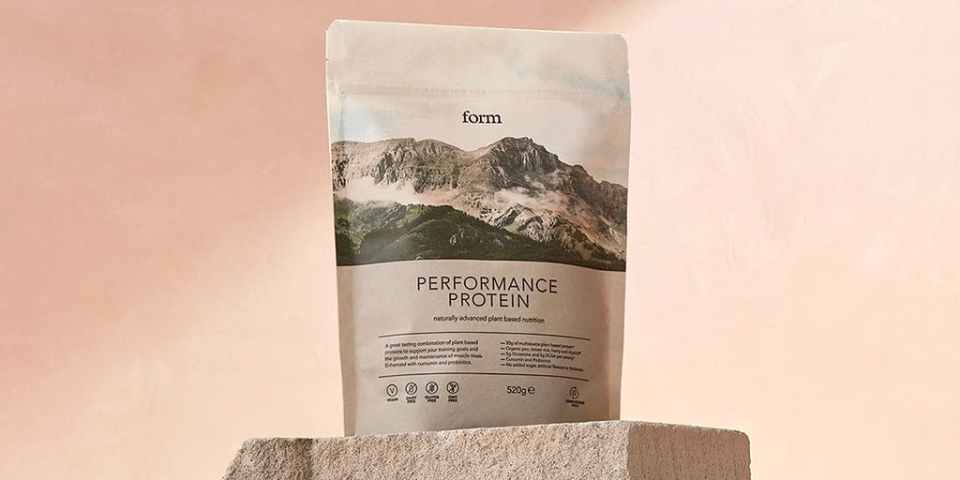PROTEIN powder is a convenient, tasty and low-calorie way to increase your protein intake, which is a quick fitness win.
Whether you’re trying to lose a few pounds, add muscle, get stronger or recover faster from training sessions (or all of the above), adding more protein to your diet has multiple benefits.

Nutritionists recommend 0.75g – 1.5g of protein per kilogram of body weight per day, depending on how active you are, so if you weigh 80kg, you’ll need to consume between 60g – 120g.
If you don’t eat many animal-based protein sources, protein powder can help you reach that target, and there are multiple brands and flavours to choose from.
To help you find the best-suited protein powder for your needs, we’ve scooped, shaken and sipped a variety of different protein powders and these are our favourites.
The best protein powders at a glance
- Best for building muscle mass: Uperform active whey and collagen
- Best whey isolate protein powder: Myprotein Impact whey isolate
- Best protein powder for fat loss: PhD Nutrition diet whey lean protein powder
- Best cheap protein powder: Amfit whey protein powder
Best protein powder for building muscle mass: Uperform active whey and collagen

Uperform active whey and collagen 900g, £39.95
- Pros: Tastes great, smooth, mixes well with water
- Cons: Only two flavours
- Rating: 4.5/5
If you want to build lean muscle mass, studies suggest that you have a better chance of making gains if you consume collagen alongside protein.
The rationale behind this is that when you take part in the strenuous resistance training needed to build muscles, it creates an enormous amount of inflammation and muscle damage.
The Uperform active whey and collagen contains collagen that’s been proven to help with the recovery of connective tissue, while protein contributes to the growth and maintenance of lean muscle mass.
This was the first protein powder that I’ve tested that contains bioactive collagen peptides (15g per serving) and I was slightly concerned about how this would impact the mixed drink’s flavour and texture.
However, the chocolate recipe tasted rich, smooth and more-ish, whether blended with milk or just shaken up with water.
After sipping it immediately after a gym workout for several sessions and then accidentally forgetting it once, I really noticed the difference in energy levels and muscle soreness in the time that I was without it – a good sign that it’s actively helping with muscle repair.
Lots of Olympic athletes and elite sportspeople share this view, with the Uperform website featuring testimonials from ultrarunners, modern pentathletes and judo champions.
As each bag contains 30 servings, it’s a decent value per money, too. Each scoop works out to just over £1, which I think is a small price to pay for something I was actively able to feel working.
| Type | Whey |
| Flavours | Strawberry, Chocolate |
| Size | 900g |
| Protein per serving | 22g |
Best clear protein powder: Myvegan lemon & lime clear vegan protein powder

Myvegan lemon & lime clear vegan protein powder 20 servings, £16.89
- Pros: Refreshing, easy to digest, low calorie
- Cons: Only 10g protein per serving
- Rating: 4/5
Protein powders have come on massively in the past few years in terms of flavours and texture.
I remember when chocolate, strawberry and vanilla were pretty much the only options, and now there are around 10 varieties of chocolate alone if you count chocolate brownie, chocolate orange, chocolate hazelnut and more.
The Myprotein clear vegan protein contains 10g of protein per serving, which is half that of a whey protein powder, but is easy to drink and feels refreshing.
While a whey protein powder can be cloudy and sometimes heavy, this is as light as a fruit cordial.
After a sweaty workout, blend this with ice and it tastes like a slushie that’s good for you.
Other features that impressed me were less than 1g of sugar per serving, to eliminate sugar spikes and dips, and added B vitamins to help with mental focus.
I highly recommend this mid-afternoon, as I found it made me feel more awake, as well as contributing to my daily protein targets.
| Type | Pea, Fava bean |
| Flavours | Lemon & Lime, 8 other flavours |
| Size | 320g |
| Protein per seving | 10g |
Best whey isolate protein powder: Myprotein whey isolate protein powder

Myprotein Impact whey isolate 1kg, £29.36
- Pros: High in protein, zero fat, gentle on the gut, impressive flavour variety
- Cons: More expensive than standard whey
- Rating: 4/5
Whey isolate is whey protein that has been filtered in a process to help remove the lactose in the powder.
The filtering process creates a leaner and lower-fat protein source with a powder that is made up of around 85 – 90% protein and 10-15% sugars and fats.
As more work is needed to produce a whey isolate and it has a higher concentration of protein, the price of whey isolate tends to be much more expensive than a regular whey powder – unless you get it from Myprotein.
Although the Myprotein Impact whey isolate is incredible value at under £1 per serving, it’s a premium product with 0.5g sugar per serving and completely fat-free as well as being low in calories at 109kcal a scoop.
Plus, with 26g of protein in every shake you make, you don’t have to consume too many of these to hit your protein goals for the day.
However, I could quite happily have consumed a few as I found the protein blended well, was smooth to the taste and the chocolate peanut butter flavour was heaven for a Reese’s fan like me.
| Type | Whey |
| Flavours | Banana, vanilla, 18 other flavours |
| Size | 1kg |
| Protein per serving | 26g |
Best protein powder for fat loss: PhD Nutrition diet whey lean protein powder

PhD Nutrition diet whey lean protein powder 2kg, £38.65
- Pros: Rich chocolate taste, low calorie, great value
- Cons: Only 16g protein per serving
- Rating: 4/5
Low in carbs and low in calories at 96kcal per serving, the PhD Nutrition diet whey lean protein powder is a solid choice for anyone sticking to a calorie-controlled diet or going through a cutting phase.
I was pleasantly surprised by the taste, which is just as rich as eating Belgian chocolate that’s melted in the mouth.
Previously, my experience with that diet protein powder was that it was watery or less flavoursome, but PhD nutritionists have managed to cut down the calories without losing any taste.
It mixes effortlessly, meaning no clumps or gritty textures—just smooth, creamy goodness.
Another bonus is that it contains other ingredients proven to burn fat and boost the metabolism such as flaxseeds, CLA, L-carnitine, and green tea extract.
The downside is that there’s only 16g of protein per serving, so you’ll need to make sure to consume other protein sources to get all the benefits of a high-protein diet.
| Type | Whey |
| Flavours | Belgian chocolate, salted caramel, 4 other flavours |
| Size | 2kg |
| Protein per seving | 16g |
Best cheap protein powder: Amfit whey protein

Amfit whey protein 1kg, £17.99
- Pros: Smooth texture, affordable, low in sugar and fats
- Cons: No micronutrients, higher in carbs than other options
- Rating: 4.5/5
An Amazon own-brand, AmFit whey protein powder is a game-changer in the world of budget-friendly protein supplements.
While many cheap options skimp on quality, AmFit whey protein delivers a punch with its premium whey protein blend, packed with essential amino acids to support muscle growth and recovery.
It boasts a smooth texture and delicious flavours which meant I actually felt drinking it was a reward rather than a chore.
Plus, it’s low in sugars and fats, so I was able to enjoy it guilt-free, whether that was after the gym or when I just needed a snack.
| Type | Whey |
| Flavours | Chocolate, coconut, 9 other flavours |
| Size | 1kg |
| Protein per serving | 22g |
Best meal replacement protein powder: Huel black edition

Huel black edition 1.53kg, £39.99
- Pros: Includes 27 vitamins and minerals, naturally sweetened, high in fibre
- Cons: Expensive
- Rating: 4.5/5
Plant-based and gluten-free, the Huel black edition packs a punch with 40g of protein per 400kcals.
What sets Huel apart is its impressive nutritional profile as each serving is loaded with 27 essential vitamins and minerals to support overall health.
Plus, it’s low in carbs and high in fibre, which helped me to feel full and satisfied, even on days when I’d trained and then had several meetings afterwards.
Made from a blend of pea and brown rice protein, there’s a complete amino acid profile, making the Huel black edition ideal for muscle recovery and growth as well as a lunch option that you don’t need to prep or cook.
I was impressed that organic coconut sugar and stevia give this a natural sweetness, as some flavoured powders use artificial sweeteners.
It also contains green tea extract, a source of antioxidants and an ingredient that’s linked to reducing inflammation and maintaining stable blood sugar levels.
| Type | Pea, brown rice |
| Flavours | Chocolate, cinnamon swirl, 7 other flavours |
| Size | 1.53kg |
| Protein per serving | 40g |
Best protein powder for recovery

Science In Sport REGO rapid recovery protein powder 1.6g, £52.85
- Pros: Ideal for endurance athletes, reduces inflammation, prevents muscle cramps
- Cons: High in calories, limited flavour options
- Rating: 4/5
If you do a lot of endurance sports such as cycling, long-distance running or triathlon training, this is a brilliant way to replenish your body’s glycogen stores as well as help your muscles recover from the exertion.
I first tried it when I was training for a marathon and found that it helped me refocus after burning thousands of calories on a 15 to 20-mile training run.
After running for hours, I found that I wasn’t hungry when I got home but I would feel faint and weak if I didn’t eat something.
REGO combines high-quality whey protein isolate with carbohydrates, so you can drink the essential nutrients your body craves after a workout.
It also includes electrolytes, which are crucial for rehydration and maintaining fluid balance after sweating it out.
With my electrolyte levels replenished, I suffered fewer muscle cramps and soreness during the day, meaning that I was able to go for a run in the morning and have just about enough energy to walk around during the day.
| Type | Whey |
| Flavours | Chocolate, strawberry, vanilla |
| Size | 1.6kg |
| Protein per serving | 20g |
How we test protein powders

We test what’s trending to help you make an informed purchase.
Every protein powder in this guide was tested for at least two weeks so we could try it at different times of the day.
We noted how it made us feel post-workout and also looked to see if there was any impact on our energy levels, mental focus and calorie cravings when sipped in the afternoon.
Aside from the clear protein powder, which we only mixed with water, we shook up each recipe with both milk and water to see how well they blended and made sure there were no clumps at the bottom of the shaker.
Each review shows the name of the tester and if you can’t see a name it’s been tested by me, Zoe Nicol, a fitness writer with five years experience in all things health and wellness.
FAQs
Is protein powder good for weight loss?
Protein powder can help with weight management in several ways, starting with its ability to increase satiety.
By making you feel full, protein can help reduce overall calorie intake, curbing the temptation to snack on less healthy options throughout the day.
For those engaging in regular exercise, particularly strength training, protein powder can be an efficient way to ensure adequate protein intake, supporting muscle recovery and growth.
This is crucial because muscle tissue burns more calories than fat, even at rest.
Therefore, by incorporating protein powder into your diet, you can potentially enhance your metabolism and increase the number of calories your body burns naturally.
Does protein powder help build muscle?
When you engage in resistance training, your muscles undergo stress, leading to small tears in the muscle fibres.
Consuming protein helps repair these tears, resulting in stronger and larger muscles over time.
Protein powder supplements make it easier to meet daily protein requirements, especially for those with busy lifestyles.
How much does protein powder cost
The cost of protein powder in the UK can vary widely depending on the brand, type, and size of the container.
On average, you might find prices ranging from about £15 to £50 for a 1kg tub.
Budget options can be as low as £10, while premium or specialised formulas (like vegan or organic) can go higher.
It’s also worth checking for bulk buying options or looking in the Black Friday or Prime Day sales for better deals.
How can you buy protein powder cheaply?
Buying protein powder in larger quantities usually translates to a lower cost per serving.
Many brands and retailers offer exclusive discounts to subscribers of their newsletters or loyalty programs, so it’s worth registering with different retailers to make sure you don’t miss a deal.
Keep an eye out for seasonal sales, such as Black Friday or New Year promotions.



